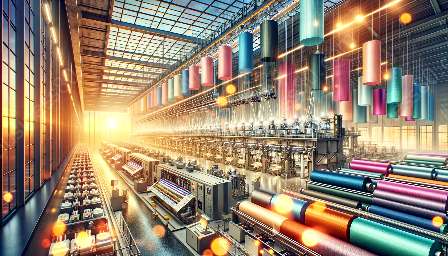In today's world, the concept of sustainability has gained tremendous importance in various industries, including textiles and nonwovens. As consumers, businesses, and governments increasingly recognize the environmental and social impacts of their actions, the textile industry is facing new challenges and opportunities related to sustainability. This article will explore the significance of sustainability in textile economics and marketing and its impact on textiles and nonwovens. We will delve into the importance and implication of sustainability on the industry, considering its economic, environmental, and social aspects.
The Importance of Sustainability in Textile Economics
Sustainability in textile economics refers to the ability of the industry to meet the needs of the present without compromising the ability of future generations to meet their own needs. From a macroeconomic perspective, the textile industry plays a significant role in the global economy, with the production and consumption of textiles and nonwovens influencing economic growth, trade, and employment. Therefore, it is essential to consider the economic aspects of sustainability within this context.
Sustainable practices in textile economics involve efficient resource utilization, waste reduction, and ethical supply chain management. By adopting sustainable manufacturing processes, such as water and energy conservation, and investing in renewable and recyclable materials, textile companies can reduce production costs and enhance their long-term competitiveness. Furthermore, sustainable economics in textiles also encompasses the fair treatment of workers and the promotion of ethical labor practices, which can improve the overall industry reputation and contribute to a more sustainable economic environment.
The Role of Sustainability in Textile Marketing
Marketing plays a crucial role in promoting sustainable practices within the textile industry. Sustainable textile marketing involves communicating the environmental and social benefits of sustainable products to consumers, as well as highlighting the efforts made by companies to reduce their environmental footprint and promote ethical production.
Consumer awareness and demand for sustainable products have been on the rise, leading textile companies to integrate sustainability into their marketing strategies. Eco-friendly textiles, nonwovens, and clothing lines are being positioned as premium, environmentally responsible choices, appealing to eco-conscious consumers who prioritize ethical and sustainable options. Successful sustainability marketing campaigns can elevate brand reputation, increase customer loyalty, and create competitive advantages in the market.
The Implication of Sustainability on Textiles and Nonwovens
The implication of sustainability on textiles and nonwovens covers a broad spectrum of considerations, ranging from material sourcing and production processes to end-of-life practices. Sustainable textile production involves the use of environmentally friendly materials, such as organic cotton, hemp, or recycled fibers, as well as eco-friendly manufacturing techniques that minimize waste and pollution.
Moreover, the concept of sustainable textiles extends to product durability, recyclability, and biodegradability, aiming to reduce the environmental impact of textile waste and promote circular economy principles. Nonwoven materials, popular for their versatile applications, are also being developed with sustainability in mind, with innovations such as biodegradable nonwovens gaining attention for their environmental advantages.
The Future of Sustainable Textile Economics and Marketing
The future of sustainable textile economics and marketing is intertwined with innovation and collaboration. As the industry continues to evolve, embracing sustainability will be essential for long-term success and competitiveness. Innovations in sustainable materials, manufacturing processes, and business models will drive positive economic and environmental impacts, while effective marketing strategies will communicate these benefits to consumers.
Furthermore, collaboration between industry stakeholders, government entities, and consumers will be vital in advancing sustainable practices in textile economics and marketing. By working together towards common sustainability goals, the textile industry can address complex challenges and create new opportunities for growth and positive change.
Conclusion
In conclusion, sustainability is a fundamental aspect of textile economics and marketing, shaping the industry's present and future. By embracing sustainable practices, the textile industry can drive economic prosperity, meet consumer demand, and minimize its environmental footprint. The significance of sustainability in textiles and nonwovens extends beyond economic and marketing implications; it reflects a commitment to ethical and responsible business practices, contributing to a more sustainable and resilient industry.
As the textile industry navigates the complexities of sustainability, it is essential to recognize the interconnectedness of economic, environmental, and social factors, and strive for holistic and impactful solutions that benefit both the industry and the planet.

